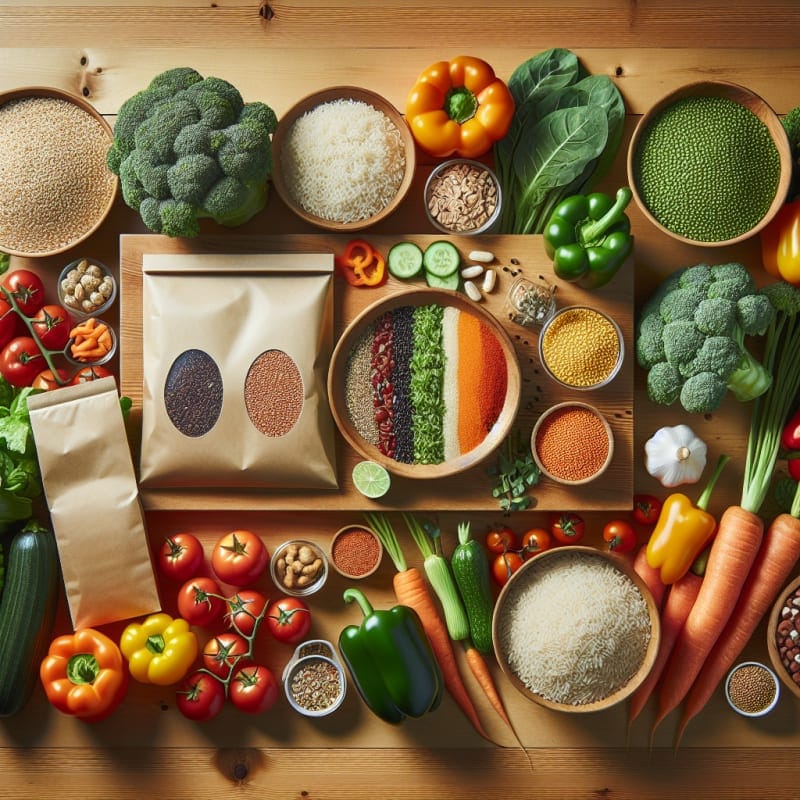Vegetable-Forward Plant-Based Foods: The 2025 Trend You Need to Know
In 2025, the plant-based movement is evolving beyond imitation meats and dairy substitutes. Consumers are now embracing vegetable-forward plant-based foods—meals and products that celebrate the natural flavors, colors, and nutrition of whole vegetables, legumes, and grains. This shift marks a new chapter in vegetarian eating, one that prioritizes clean label ingredients and transparent sourcing.
Why Vegetable-Forward Eating Is the Future of Plant-Based Foods
For years, plant-based innovation focused on replicating the taste and texture of animal products. But as consumers become more health-conscious and environmentally aware, the demand has shifted toward whole plant ingredients and minimally processed foods. According to Tastewise’s 2025 Plant-Based Food Trends Report, people are increasingly drawn to foods that highlight vegetables themselves—like roasted carrots, lentil-based bowls, and chickpea pasta—rather than imitation meat patties.
This trend aligns with a broader cultural movement toward authenticity and simplicity in food. Consumers want to recognize every ingredient on the label and understand where it comes from. That’s the essence of the clean label vegetarian foods movement.
Key Drivers Behind the Vegetable-Forward Trend
- Health Awareness: Shoppers are prioritizing nutrient density and fiber-rich whole foods over highly processed alternatives.
- Environmental Impact: Growing vegetables and legumes typically requires fewer resources than producing meat analogs.
- Culinary Creativity: Chefs and brands are exploring vegetables as the main attraction, not just a side dish.
- Transparency: Clean label products build trust by avoiding artificial additives and complex ingredient lists.
Clean Label Vegetarian Foods: What It Really Means
The term clean label refers to food products made with simple, recognizable ingredients—no artificial preservatives, colors, or flavor enhancers. In 2025, clean label standards are becoming a baseline expectation for vegetarian consumers.
According to Restaurantware’s Top 5 Vegan Trends for 2025, brands are reformulating recipes to eliminate unnecessary additives and highlight natural plant-based ingredients. This includes using vegetable purees for color, herbs for flavor, and legumes for texture and protein.
Examples of Clean Label Plant-Based Products
| Product Type | Main Ingredients | Clean Label Features |
|---|---|---|
| Vegetable-Based Pasta | Chickpeas, lentils, spinach | Gluten-free, high-protein, no artificial binders |
| Plant-Based Dips | Roasted eggplant, tahini, olive oil | No preservatives, naturally flavored |
| Frozen Veggie Meals | Broccoli, quinoa, sweet potatoes | Whole ingredients, minimal sodium |
Whole Plant Ingredients: The Core of 2025 Vegetarian Innovation
The new wave of vegetarian food innovations centers on using whole plants as the foundation of meals. Instead of ultra-processed soy or pea isolates, brands are turning to lentils, mushrooms, beets, and seaweed for both flavor and function.
As TriplePundit reports, companies are developing “next-generation” plant-based foods that rely on fermentation, upcycled vegetables, and regenerative farming practices. These innovations not only improve sustainability but also enhance taste and nutrition.
Top Whole Plant Ingredients to Watch in 2025
- Mushrooms: Used for natural umami flavor and meaty texture.
- Legumes: Lentils, chickpeas, and black beans are powering protein-rich meals.
- Sea Vegetables: Seaweed and kelp add minerals and depth of flavor.
- Root Vegetables: Beets, carrots, and parsnips are being reimagined in snacks and entrees.
How Food Scan Genius Supports Clean Label Choices
As ingredient lists grow more complex, consumers need tools to help them make informed decisions. The Food Scan Genius app allows users to scan food labels and instantly identify hidden additives, allergens, and processing levels. It’s especially useful for those seeking clean label plant-based products or managing dietary preferences.
“I started using Food Scan Genius to check my favorite vegetarian snacks, and it’s been eye-opening. Now I can easily find the cleanest, most natural options.” — Maya L., vegetarian home cook
Vegetarian Food Innovations: Beyond Meat Alternatives
According to PETA’s 2025 Vegan Food Trends, the next generation of plant-based products is moving away from imitation meats toward authentic vegetable-based dishes. Expect to see more cauliflower steaks, jackfruit tacos, and beetroot burgers on menus and store shelves.
This shift reflects a deeper appreciation for vegetables as culinary heroes. It also aligns with the growing consumer desire for foods that are both nutritionally dense and environmentally responsible.
Emerging Categories in Vegetable-Forward Foods
- Ready-to-Eat Veggie Bowls: Balanced meals with grains, legumes, and seasonal vegetables.
- Fermented Vegetable Snacks: Kimchi chips and pickled veggie bites for gut health.
- Plant-Based Dairy Alternatives: Cashew yogurt and oat-based cheese spreads.
- Vegetable Desserts: Beet brownies and carrot cake energy bites.
Why This Trend Matters for Everyone
The rise of vegetable-forward plant-based foods isn’t just a win for vegetarians. It benefits all consumers by promoting transparency, sustainability, and better nutrition. With fewer additives and more whole ingredients, these foods support overall wellness and reduce environmental impact.
For food brands, this trend offers a chance to innovate responsibly—by sourcing locally, reducing waste, and communicating clearly about ingredients.
FAQs About Vegetable-Forward Plant-Based Foods
1. What does “vegetable-forward” mean?
“Vegetable-forward” refers to meals and products that make vegetables the star of the dish, emphasizing their natural flavors, colors, and nutrients rather than using them as side components.
2. How are clean label vegetarian foods different from regular vegetarian foods?
Clean label vegetarian foods use simple, recognizable ingredients without artificial additives, preservatives, or colorings. They focus on transparency and minimal processing.
3. Are vegetable-forward foods healthier than imitation meats?
Generally, yes. Vegetable-forward foods often contain more fiber, vitamins, and minerals, and less sodium and saturated fat than processed meat substitutes.
4. What are some examples of whole plant ingredients?
Whole plant ingredients include lentils, beans, mushrooms, seaweed, and root vegetables—foods that are used in their natural form rather than as isolated proteins or extracts.
5. How can I identify clean label plant-based products?
Look for short ingredient lists with familiar names. You can also use the Food Scan Genius app to analyze labels and verify ingredient quality.
6. What are the biggest vegetarian food trends for 2025?
Trends include vegetable-forward meals, fermented veggie snacks, upcycled produce, and plant-based products made from whole ingredients rather than processed isolates.
Final Takeaway
The future of vegetarian eating is bright, colorful, and rooted in nature. As consumers demand more transparency and authenticity, vegetable-forward plant-based foods and clean label vegetarian products are setting new standards for health and sustainability. Whether you’re a lifelong vegetarian or simply exploring plant-based options, now is the perfect time to rediscover the power of whole plants.
Use tools like Food Scan Genius to make smarter, more transparent food choices—and join the movement toward a cleaner, greener plate.





